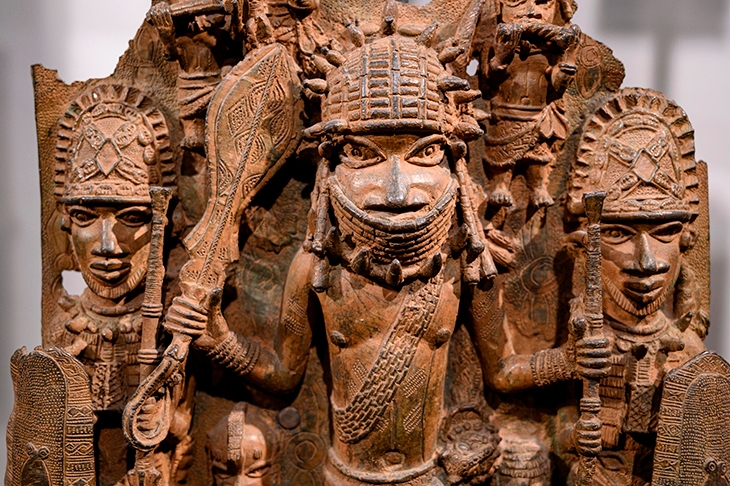A book about the looted African art known as the Benin Bronzes begins by clarifying that most of them are not actually bronze, and none of them comes from the country of Benin. Yet as this gripping work of live history makes clear, such name ambiguity feels entirely appropriate for art so sophisticated in creation yet so controversial in acquisition. Little about the Benin Bronzes is black and white.
The exact age is unknown for the cache of carved ivory, coral and metal plaques, heads, statuary, swords and other ceremonial objects, the best guess emphasising the circa in ‘circa 16th century’. Who the heads represent is also not settled — most likely monarchs from the now faded kingdom of Benin, a tessera in the ethnic mosaic of modern-day Nigeria, but possibly gods, or vanquished enemies. Even the size of the hoard is unknown, some estimates saying 2,000, others double that.
What is unarguable is their artistic merit. When western experts first saw them at the turn of the 20th century, comparisons were made with the works of Benvenuto Cellini and the finest sculptors of ancient Greece. The Benin Bronzes alone recalibrated how the art world regarded a continent. But it is how those westerners got to see the Benin Bronzes that supercharges them to this day, placing the cache at the heart of current controversies over race, treasure and history. With only a very few exceptions, they were all nicked by British colonial forces in 1897.
For a long time the art establishment refused to accept that the Benin Bronzes were even African
We are not referring here to a few junior ranks surreptitiously squirrelling the stuff away like the Royal Marines in 2003 who pinched gold-plated plumbing from Saddam Hussein’s palace in Basra. When British forces conquered Benin City, they were all involved, right up to the admiral in overall command, eager to cash in on what one officer called ‘a regular harvest of loot’.
The account of how Britain scrambled to take an interest in the territory in the late 19th century; the manoeuvrings of colonial carpetbaggers inveigling its king, or Oba, into supposedly signing away rights; the insensitivity of a headstrong British colonialist who was killed by warriors and the subsequent punitive attack on the capital by a British force is all well handled by Barnaby Phillips.








Comments
Join the debate for just £1 a month
Be part of the conversation with other Spectator readers by getting your first three months for £3.
UNLOCK ACCESS Just £1 a monthAlready a subscriber? Log in